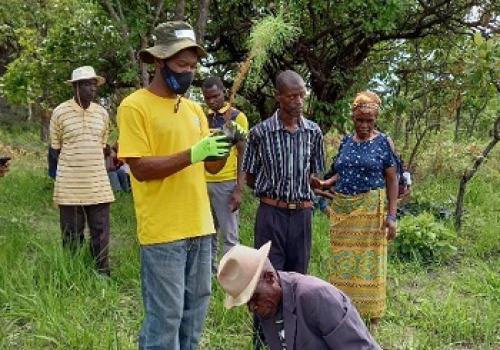The project on mitigating the impact of Covid-19 on food and nutrition security using Climate Smart Technologies, which is funded by the European Union (EU) through the Southern African Development Community (SADC), may be useful in providing alternative livelihood sources in Zambia.
Scaling up the project, launched in the country by the Centre for Coordination of Agriculture Research and Development for Southern Africa (CCARDESA), may reduce the area cleared for cultivation, provide training and information services that encourage afforestation resulting in more children gaining consistent access to education, contributing to the broader social development agenda.
CCADESA, with technical support from Bembani Group, launched the projects to mitigate the impact of Covid-19 on food and nutrition security using Climate Smart Technologies in Eswatini, Mozambique, Zambia and Zimbabwe in November and December last year.
The projects are an extension of the Global Climate Change Alliance Plus (GCCA+) programme which seeks to strengthen the capacity of SADC Member States to undertake regional and national adaptation and mitigation actions in response to the challenges caused by the effects of climate change.
The EU has contributed Euro 8 million to the GCCA+ project to increase the capabilities of SADC Member States to mitigate and adapt to the effects of climate change, and to have their voices better heard in the international climate change negotiations.
Covid-19 has caused a humanitarian crisis, negatively impacting the food and nutrition status of millions of households worldwide. The escalating threat on livelihoods, food and nutrition security due to increasing cases, lockdowns and health-related restrictions calls for urgent interventions to minimise the impact to the most affected communities.
Project launch in Zambia.
The project team arrived in Zambia on 5 December, 2020 and was hosted by Save Environment and People Agency (SEPA), a non-profit making organisation which strives to improve the standard of living of rural communities and the poor in Zambia. The organisation offers entrepreneurship, capacity building, tree planting, sustainable agriculture, water and sanitation, and climate change issues. The SEPA mission is to advocate for a society which does not harass and degrade the environment so that people live in an environment where there is clean and safe water, clean air, healthy foods, and hence healthy people.
SEPA is engaged in the SADC Great Green Wall Initiative, hence it embarked on a project of restoration of the environment or the natural resources which will centre on the planting of trees and sensitisation in the Zambezi district.
Meetings with stakeholders
Pre-launch meetings were held with SEPA and the representative of the District Commissioner of Mufumbwe District. In his remarks, the representative of the District Commissioner, Mr Chitambala Agrippa, expressed gratitude to the EU for supporting the district and committed the district towards supporting the implementation of the project.
Project Launch
The project was launched at the Ministry of Health boardroom on 8 December 2020. Among participants at the launch were the SEPA Board Secretary and Vice Chairperson, heads of departments at the district council, including those from the Office of the President and Cabinet, district agricultural office (DACO), planning, community development, sports, fisheries and livestock and social welfare. The DACO, who represented the DC, requested all the heads of departments to help SEPA in implementing the project
Field Visit
On 9 December 2020, the project team, with the beneficiaries as well as Mr John Phiri of the Ministry of Agriculture, visited the project site where the beneficiaries who had started putting up gardens, had abandoned them due to water scarcity.
Present during the field visit and site identification was the local headman who also participated in tree planting and assured all present of the support of the local authority to the project and confirmed that the group had been allocated the land. The Ministry of Agriculture official indicated that there was willingness to meet with the beneficiary group to discuss the project, to help them with project planning (even sourcing the requisite quotations) and implementation and for them to benefit from diverse resources available within the government system. Such support, he indicated, would include mapping, demarcation, and registration in the government system of the land allocated.
The field visit was characterised by enthusiasm by the beneficiaries indicating both willingness and commitment to the project.
The link between deforestation and climate change.
A reconnaissance drive through Mufumbwe village and into the surrounding forests revealed active deforestation driven by slash and burn agriculture, locally known as chitemene, for small scale shifting cultivation. Crops grown on the cleared fields include maize, groundnuts and cassava. Discussions with project beneficiaries and officials in the Ministry of Agriculture indicated that the practice is widely practiced and families move to the forest, where they temporarily settle, to clear the land, till and plant before coming back to the village. Children encountered in the forest indicated that they do not go to school.
Land Use Change and Forestry (LUCF) and agriculture are widely recognised as a major contributor to greenhouse gas emissions and contribute significantly to climate change, whereas forests are critical in carbon sequestration, hence Chitemene as practised in Mufumbwe is a concern for climate change mitigation.

